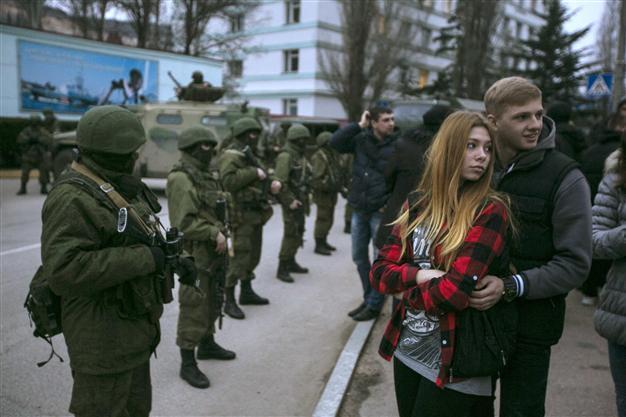Sleepy Crimean port turns out for Russian troops
BALACLAVA, Ukraine – Reuters

A couple stands next to armed servicemen outside a Ukrainian border guard post in the Crimean town of Balaclava March 1, 2014. REUTERS Photo
When a convoy of Russian military vehicles unloaded dozens of armed troops into this sleepy Crimean port town on Saturday, residents thronged around them honking car horns, snapping pictures and waving Russian flags.Although the Russian-speaking servicemen bore no insignia, their vehicles had Russian military plates and there was no doubt among residents they were deployed from the nearby Russian base to take up position outside a Ukrainian border guard base.
Ludmila Marchenko, a retired teacher, simply burst into applause when asked about the masked soldiers with automatic rifles standing guard nearby.
"At first we were in shock, now we see it as a liberation," the 66-year-old told Reuters.
Russian President Vladimir Putin demanded and won approval from his parliament on Saturday for military action in Ukraine to protect Russian citizens. Moscow says it has not yet decided whether to send troops. But clearly it has already acted here.
Those residents who felt foreboding as they watched the armoured vehicles roll mostly hung back in the crowd.
"This is a mess. This is an invasion. I think this is an act of aggression by Russia," said Dmitry Bessonov, 55, a retired miner from Donetsk.
Such voices may be in the minority. Ethnic Russians, who are in the majority in the Crimean peninsula, have been angered by nationalist rhetoric from the protesters who toppled pro-Russian President Viktor Yanukovich after months of demonstrations in Kiev's main square, known as the Maidan.
"They made a big mistake when they stood on Maidan and said they wanted to ban the Russian language ... We don't want to be second-class citizens," said Marchenko's brother Vitaly, a civilian sailor.
"I am not against a united Ukraine ... Yes, our president was not great. Yes, there was corruption and theft, but we don't want to live under these conditions. We are just sick of these speeches by fascists and neo-fascists."
The sight of Russian boots on the ground here on the outskirts of Sevastopol - home to the Black Sea Fleet - is nothing unusual to residents, who quickly adapted to the presence of more than 100 armed men parked along the main strip of the bay that is popular with tourists.
The masked soldiers barked at reporters to "move back", refusing to identify themselves, but stood congenially shoulder -to-shoulder with residents who posed for photographs. They happily accepted cigarettes from the crowd.
In a bizarre carnival-like scene, Russian Orthodox priests chanted prayers, while a wedding party drove by loudly honking their car horns.
"It is a great joy for is," said Vladimir Tikhonov, 53, an electrician. "I want this to be Russian land and it will be."
Valentina Magomedova, an accountant whose curiosity drew her to the scene, said people regretted a decision by Soviet leader Nikita Khrushchev, himself a Ukrainian, to transfer the Crimea from Russia to Soviet Ukraine in 1954.
"The new authorities (in Kiev) are not legitimate. We trust Putin, we love Russia," she said. "We were part of Russia and we are sorry still that Khrushchev gave us away."
While most residents had no love for Kiev's new leaders, some were worried by the dangers of the situation and wary of Russia's designs. Confronting the mute soldiers, one man vented his frustration, "What are you doing here? Get lost."
"I have a business, tourist season is beginning, I can't have a war," he said under his breath, shaking his head and turning his back on the 10 trucks and five armoured vehicles.
A nearby restaurant decided to shut its doors early and keep them shut for the next few days.
"That's me losing my salary, if this keeps up," said Natalia Fomichova, 35, a lively blonde waitress at the seaside restaurant, overlooking opulent private motor boats parked in Balaclava bay.
"No one asked us. We are like puppets for them ... We have one Tsar and god - Putin," she quipped.
















